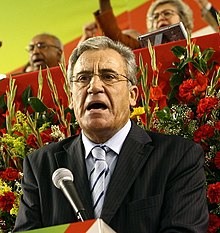Jerónimo de Sousa
| Jerónimo de Sousa | |
|---|---|
 |
|
| General Secretary of the Portuguese Communist Party | |
|
Assumed office 27 November 2004 |
|
| Preceded by | Carlos Carvalhas |
|
Member of the Assembly of the Republic Elections: 1976, 1979, 1980, 1983, 1985, 1987, 1991, 2002, 2005, 2009, 2011, 2015 |
|
|
Assumed office 10 March 2005 |
|
| Constituency | Lisbon District |
|
In office 5 April 2002 – 9 March 2005 |
|
| Constituency | Setúbal District |
|
In office 3 June 1976 – 26 October 1995 |
|
| Constituency | Lisbon District |
| Personal details | |
| Born |
Jerónimo Carvalho de Sousa 13 April 1947 Pirescoxe, Loures, Portugal |
| Political party | Portuguese Communist Party (since 1974) |
| Occupation | Politician |
| Profession | Metallurgic worker |
Jerónimo Carvalho de Sousa (Portuguese pronunciation: [ʒɨˈɾɔnimu dɨ ˈsozɐ]; born 13 April 1947) is a Portuguese politician who has been General Secretary of the Portuguese Communist Party since the 17th Congress of the Party in November 2004.
He is a member of the Assembly of the Republic and was also a candidate in the 2006 presidential election.
Born in Santa Iria de Azoia, Loures, Lisbon District, Jerónimo de Sousa was born into a humble working-class family, dominated by the right-leaning regime of António de Oliveira Salazar. At the age of 14, he followed the path of most of the children of the working-class families grewing-up in the industrial belt of Lisbon. He became a machine tuner in a siderurgy near his hometown.
He started his anti-fascist activities soon after, while integrating the cultural working class associations of his hometown in the 1960s. In that period he made contact with the strong clandestine organization that the Portuguese Communist Party had in the suburbs of Lisbon, where he, being one of the few able to read, used to read the illegal communist newspaper Avante!, in secrecy, for the other workers. He would later formalize his membership, right after the Carnation Revolution, in 1974.
From 1969 to 1971 Jerónimo de Sousa participated in the Colonial War against the liberation movements that were struggling in the Portuguese colonies in Africa. He served in Guinea-Bissau, forced to fight the Marxist movement of liberation, the PAIGC.
...
Wikipedia
